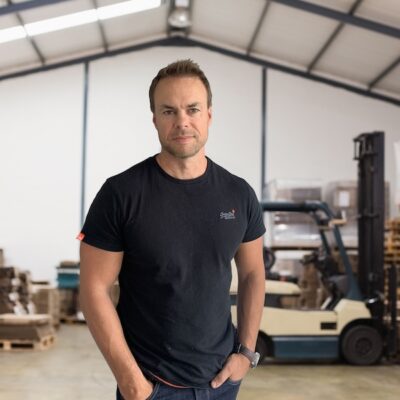All shipshape and Bristol fashion
Regular diversification and pivoting of their business model has seen Robert and Margie Baldock’s business Shipwreck Trading safely navigate treacherous economic seas. This is their story. There is no such […]
Regular diversification and pivoting of their business model has seen Robert and Margie Baldock’s business Shipwreck Trading safely navigate treacherous economic seas. This is their story.
There is no such thing as the quiet life for retiree Robert Baldock, owner of Lower Hutt-based business Shipwreck Trading. In fact, the shop, which sells an eclectic range of antique, nautically-themed pieces, has a story which begins in the bustling shipyards of India and Bangladesh.
It was in these shipyards – where rundown ships are dismantled and individual parts on-sold – that Robert first had the idea of importing and selling shipwreck pieces, including beautiful antique ship lights, into New Zealand. For Robert, it proved worthwhile: “I bought as much as I could carry and then some. I sold it in just over a week, and the margins were quite considerable.”
Unintentionally, Robert had discovered what could be both a profitable and enjoyable post-retirement venture following his departure from a full-time job as an events manager. Living at the Seaview Marina on a trawler, which he and his wife Margie renovated in a vintage-industrial style, Robert was quick to realise the potential of their location with 600-odd ships on their doorstep.
However, because of its unique products and location, the success of Shipwreck Trading was never guaranteed and they were unsure whether customers would travel to Seaview Marina to visit the store. That made it challenging to forecast in order to take on a lease, but they found a way around the problem.
“We organised a stage rental plan with the Marina, so that it was cheaper in year one and two. In year three and four it would increase and overall we agreed on an increase for six years.”
They leased a shop within the retail section of the Marina, and with a bit of Kiwi ingenuity, were able to fit-out the retail space for $2,200 by sourcing 100 apple pallets from a local yachtie, which they used to create an appropriately rustic, dockside-esque interior.
From day one Shipwreck Trading proved popular, so much so that when the fishing shop next door became available, Robert and Margie extended the shop space, saying, “We basically put a hole in the wall and kept the bait and tackle. So we doubled our physical size within the first 6 months, and our clientele increased through the bait sales too.”
In its third month, Shipwreck Trading began sponsoring yacht races to increase the shop profile. Participants were required to enter the races at the shop, and prize-givings were held there too, which contributed to a steady increase in foot traffic.
Venturing online
After six months in business, Shipwreck Trading started showcasing products online, via a Trade Me store. It marked a noticeable jump in sales, reaching customers across the country and overseas. Online sales now represent 60 percent of their business, and they have recently appointed an online manager and a retail manager.
As Robert, whose background includes organising events around New Zealand’s first America’s Cup, has come to learn, “It’s a big skill trading online – it takes a certain hustle factor. You need everything right to entice the person to want to know more about that particular product.”
Last year Robert was able to travel to the shipyards of India and Bangladesh to purchase individual ship lights, which are restored and re-wired to New Zealand standards before being placed in the store for sale. But even Covid-19 has not deterred Robert from importing new pieces, and he has used it as an opportunity to correspond with the owners of the shipyards via videolink in order to select items.
There are plenty of treasures to be found in the farm sheds and garages of New Zealanders, too, but Robert is careful about protecting New Zealand’s history. “It’s great to advertise overseas, but it’s important that New Zealand pieces stay here. Like the Whanganui beacon light from the river mouth – it’s an historic piece. I wrote to the Mayor and said, ‘You need to keep this in Whanganui’, and in the end it was bought by Whanganui Lighthouse.”
Product extension
When Robert and Margie realised that 92 percent of their customers were male, they created a plan to appeal to women, too. They began making their own nautical cushions from flags, leaving the ropes and brass fittings as an adornment, and quickly saw their female audience grow to 48 percent.
This shift in customer base and an increase in turnover has allowed them to move into leather furniture, such as smoker’s armchairs, and become more adventurous in the items they’re purchasing.
“In the beginning we sold items priced under $2,000. Then we started bringing in major shipwreck pieces priced at $5,000 and it was surprising to see them sell extremely well. Out of the woodwork came all these collectors, so we started bringing in beautiful ship lights costing $3,000 upwards. Now, when a sale goes through at $5,000 to $6,000 I’m not surprised, but a year ago I never dreamed we could sell that.”
More diversification
With such a successful year behind them, the sky’s the limit for Shipwreck Trading. They have ventured into commercial fit-outs, designing the interior of nearby Compass Cafe, and are undertaking their first concession in Picton’s Maritime Museum with retail sales of Shipwreck Trading items. There is also potential to extend that to other maritime-related attractions around New Zealand, in which Robert and Margie will design, build and install the shop fittings themselves.
Not content to sit still for long, Robert is also hoping to establish a New Zealand Merchant Navy visitor centre as part of Shipwreck Trading.
“We’re waiting patiently for a space to become available. Unfortunately during the wars the Merchant Navy wasn’t recognised in the same way that the Royal Navy was, so there’s a whole story to tell there, and artefacts to show”.
Story by Rebecca Reed.






